- Home >
- Product >
- Forklift >
- Electric Forklift >
- View Details
Good Quality DF20 Electric Forklift
Electric forklifts are at the forefront of technological innovation in the field of material handling and logistics. As industries increasingly lean towards sustainability and efficiency, these battery-powered forklifts are gaining prominence for their eco-friendliness and operational efficacy.
- DF20
- ZHUOXIN
- Electric Forklift
- shandong.china
- TT, Paypal, Credit card, Western union
- +86-15163766288
- Operational Cost Efficiency: Lower fuel costs and reduced maintenance requirements make them more economical in the long run.Noise Reduction: These forklifts operate quietly, contributing to a more pleasant and less disruptive working environment.
Description

Electric forklifts are at the forefront of technological innovation in the field of material handling and logistics. As industries increasingly lean towards sustainability and efficiency, these battery-powered forklifts are gaining prominence for their eco-friendliness and operational efficacy.
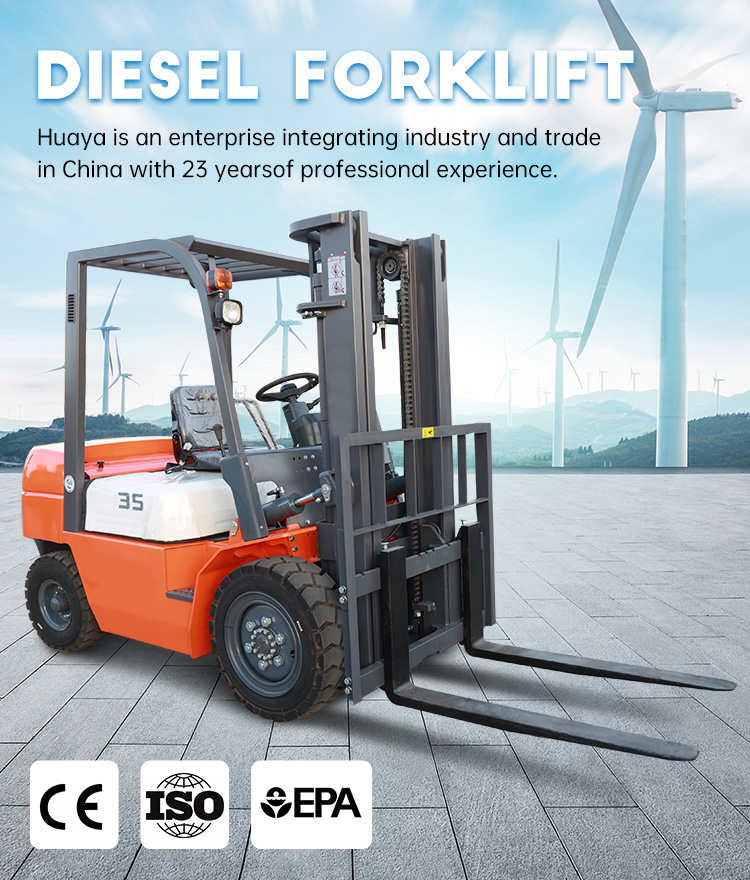
Design Innovations and Key Features
The design of electric forklifts is centered around their electric motor and battery system, which sets them apart from traditional forklifts:
Power Source: Electric forklifts are powered by rechargeable industrial batteries, typically lead-acid or newer, more efficient lithium-ion batteries.
Lift Capacity and Mechanism: These forklifts are equipped with robust lifting mechanisms, capable of handling various load capacities suitable for different industrial needs.
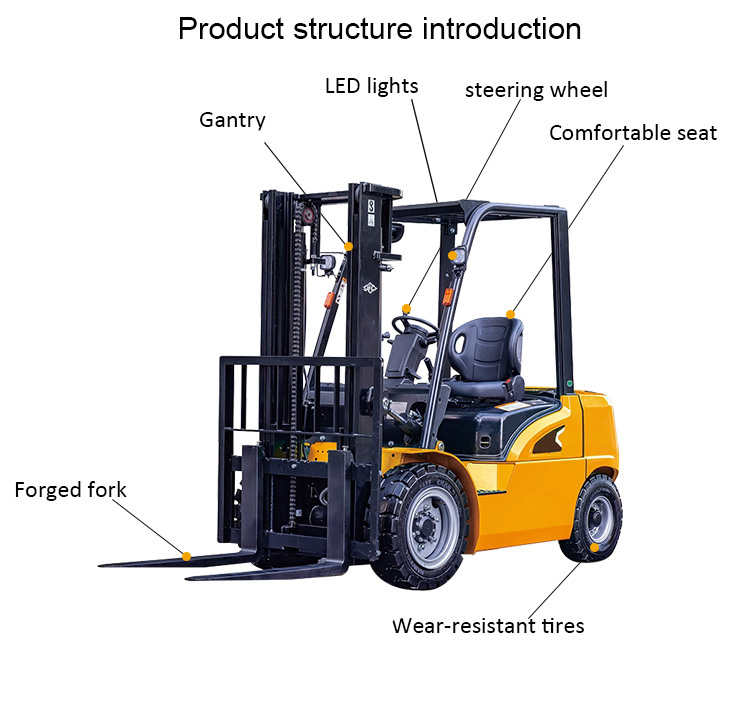
Ergonomic Operator Cabins: The cabins are designed with the operator's comfort and safety in mind, featuring intuitive controls and enhanced visibility.
Compact and Agile Build: Electric forklifts are often more compact than their fuel-powered counterparts, allowing for greater maneuverability in tight spaces.
Emission-Free Operation: A significant advantage is their zero-emission operation, making them ideal for indoor environments and reducing the carbon footprint of operations.
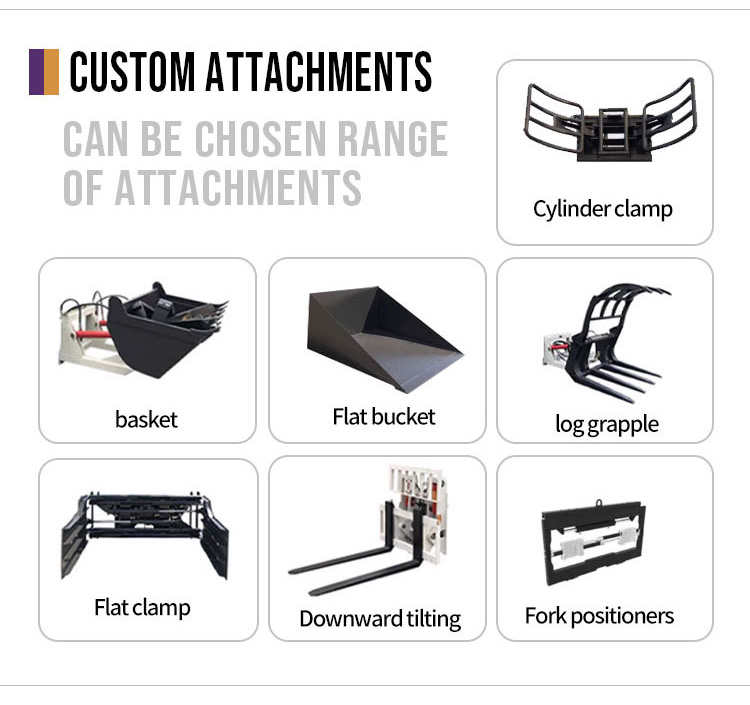
Versatile Applications
Electric forklifts are versatile, finding applications in diverse environments such as:
Warehousing and inventory management
Loading and unloading of goods in docks and terminals
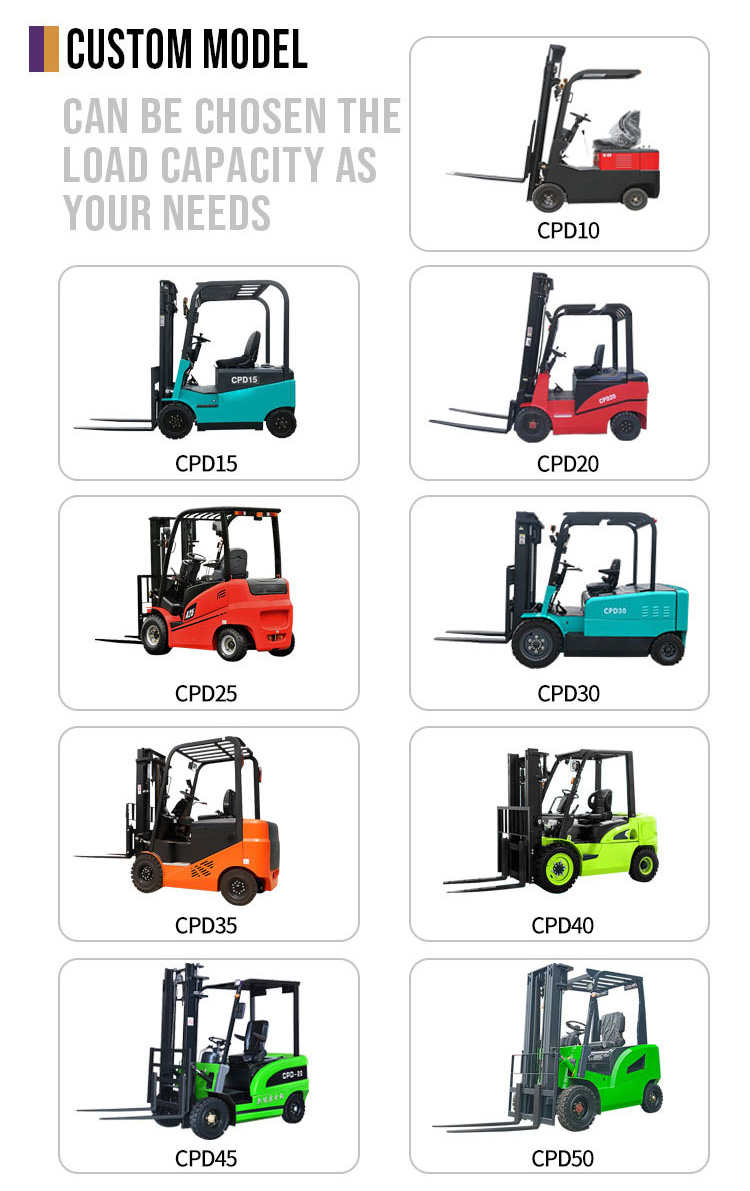
Retail stock management
Light to medium-duty manufacturing
Advantages Over Traditional Forklifts
The adoption of electric forklifts brings several advantages:
Environmental Impact: They significantly reduce greenhouse gas emissions and pollution.
Operational Cost Efficiency: Lower fuel costs and reduced maintenance requirements make them more economical in the long run.
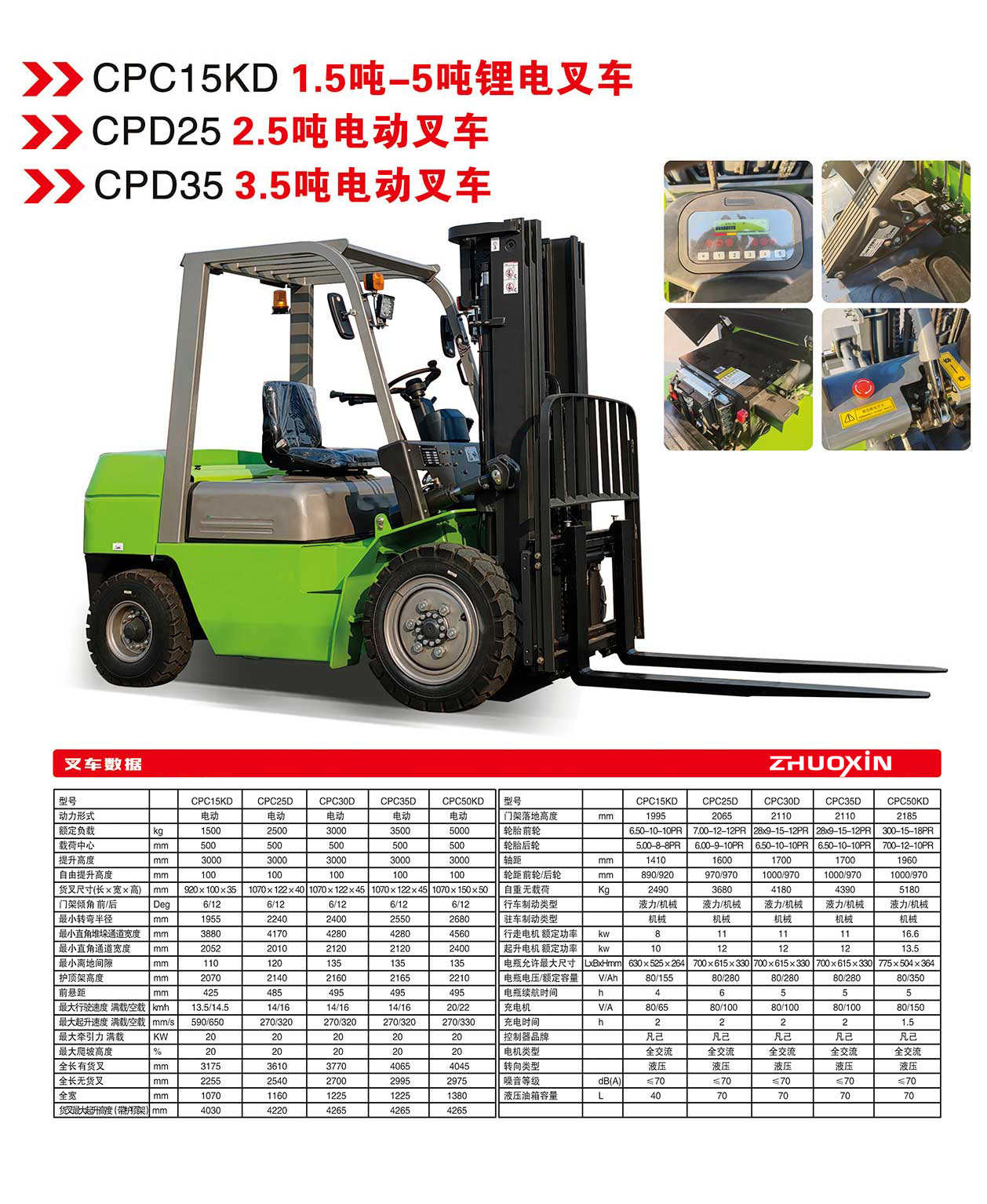
Noise Reduction: These forklifts operate quietly, contributing to a more pleasant and less disruptive working environment.
Improved Air Quality: Their zero-emission nature improves indoor air quality, crucial for worker health.
Maintenance and Safety Protocols
Proper maintenance, especially battery care, is crucial for maximizing the lifespan and efficiency of electric forklifts. Safety training for operators, regular inspections, and adherence to operational guidelines ensure a safe working environment.

Conclusion
Electric forklifts are not just tools for lifting and transporting materials; they are a testament to the shift towards sustainable and efficient industrial practices. As the world moves towards greener solutions, electric forklifts stand out as a smart choice for businesses looking to enhance operational efficiency while reducing environmental impact.
This introduction provides an in-depth look at electric forklifts, focusing on their innovative design, diverse applications, advantages over traditional forklifts, and the importance of maintenance and safety in their usage.
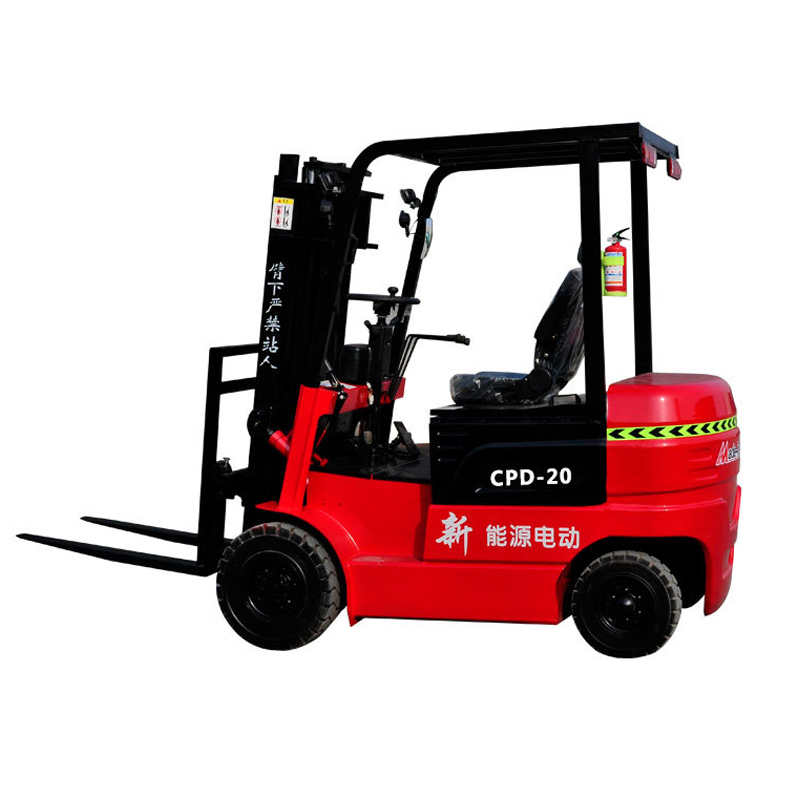
Electric forklifts have emerged as a game-changer in the world of material handling and warehouse operations. These versatile machines offer eco-friendly and efficient solutions for lifting, moving, and stacking goods in a wide range of industries. In this comprehensive guide, we will explore the features, benefits, types, and applications of electric forklifts.
Features of Electric Forklifts:
Electric-Powered: Electric forklifts are powered by rechargeable batteries, eliminating the need for traditional fossil fuels. This makes them eco-friendly and suitable for indoor use due to zero emissions.
Quiet Operation: Unlike their internal combustion counterparts, electric forklifts operate quietly, reducing noise pollution in warehouse environments.
Efficiency: Electric forklifts are known for their energy efficiency and low operating costs, as electricity is generally more cost-effective than diesel or propane.
Precise Control: Electric forklifts offer precise control, making them ideal for delicate or sensitive materials.
Compact Design: Many electric forklift models have a compact design, allowing for improved maneuverability in tight spaces.
Electric forklifts have emerged as pioneering solutions in the world of material handling, combining efficiency, sustainability, and adaptability to meet the demands of modern industry. These eco-friendly machines have redefined the way businesses move and manage materials, providing a cleaner, quieter, and cost-effective alternative to traditional internal combustion forklifts. In this comprehensive overview, we will delve into the features, benefits, types, and diverse applications of electric forklifts.
Features of Electric Forklifts:
Electric-Powered Efficiency: Electric forklifts rely on rechargeable batteries as their power source, significantly reducing carbon emissions and environmental impact compared to their fossil fuel counterparts.
Whisper-Quiet Operation: Electric forklifts operate almost silently, contributing to a more peaceful and productive work environment, especially in noise-sensitive areas.
Energy-Efficient: Renowned for their energy efficiency, electric forklifts translate into lower operational costs over time, as electricity is often more economical than other fuels.
Precision Handling: Electric forklifts offer precise control and maneuverability, making them ideal for handling delicate loads or working in confined spaces.
Compact Design: Many electric forklift models are designed with a compact footprint, enabling them to navigate narrow aisles and tight storage spaces with ease.
Electric forklifts Types of Electric Forklifts:
Electric forklifts come in several types, each tailored to specific material handling needs:
Counterbalance Electric Forklifts: Versatile and suitable for general material handling tasks, these forklifts are commonly used in warehouses, factories, and distribution centers.
Three-Wheel Electric Forklifts: Engineered for exceptional maneuverability in confined spaces and narrow aisles, they excel in indoor settings.
Warehouse Reach Trucks: Reach trucks are designed for high stacking in narrow aisles, optimizing vertical storage space utilization.
Electric Pallet Jacks: Electric pallet jacks simplify the movement of palletized loads within warehouses, streamlining distribution processes.
Order Pickers: Order pickers are tailored for efficient item selection from shelves at varying heights, essential for e-commerce and retail fulfillment centers.
Electric forklifts Advantages of Electric Forklifts:
Eco-Conscious Operation: Electric forklifts produce zero emissions, contributing to a greener, more sustainable work environment and aligning with environmental goals.
Cost-Effective: Lower operating costs, reduced maintenance requirements, and energy efficiency make electric forklifts a cost-effective choice in the long term.
Reduced Noise Levels: The quiet operation of electric forklifts minimizes noise pollution, making them well-suited for indoor use without causing disruptions.
Enhanced Safety: Precise load handling and reduced emissions improve workplace safety and air quality, promoting employee well-being.
Electric forklifts Applications of Electric Forklifts:
Electric forklifts find diverse applications across industries, including:
Warehousing and Distribution: Electric forklifts are indispensable for efficiently moving, stacking, and retrieving goods in warehouses and distribution centers.
Manufacturing: They play a crucial role in production processes by facilitating the movement of raw materials and finished products.
Retail: Electric forklifts assist in restocking store shelves, managing inventory, and fulfilling customer orders in retail settings.
Construction: Compact electric forklifts are utilized in construction sites for transporting materials and equipment within job sites.
Agriculture: They are employed in agricultural operations, aiding in handling produce and managing inventory in barns and storage facilities.
Electric forklifts Conclusion:
Electric forklifts represent a paradigm shift in material handling, embodying sustainability, efficiency, and cost-effectiveness. Their ability to provide precise control, minimize noise, and reduce emissions aligns seamlessly with the growing emphasis on eco-friendly practices in industries worldwide. As businesses continue to prioritize environmental responsibility and operational efficiency, electric forklifts are poised to remain at the forefront of modern material handling solutions, driving sustainability and innovation in logistics and distribution.

Design Innovations and Key Features
The design of electric forklifts is centered around their electric motor and battery system, which sets them apart from traditional forklifts:
Power Source: Electric forklifts are powered by rechargeable industrial batteries, typically lead-acid or newer, more efficient lithium-ion batteries.
Lift Capacity and Mechanism: These forklifts are equipped with robust lifting mechanisms, capable of handling various load capacities suitable for different industrial needs.

Ergonomic Operator Cabins: The cabins are designed with the operator's comfort and safety in mind, featuring intuitive controls and enhanced visibility.
Compact and Agile Build: Electric forklifts are often more compact than their fuel-powered counterparts, allowing for greater maneuverability in tight spaces.
Emission-Free Operation: A significant advantage is their zero-emission operation, making them ideal for indoor environments and reducing the carbon footprint of operations.

Versatile Applications
Electric forklifts are versatile, finding applications in diverse environments such as:
Warehousing and inventory management
Loading and unloading of goods in docks and terminals

Retail stock management
Light to medium-duty manufacturing
Advantages Over Traditional Forklifts
The adoption of electric forklifts brings several advantages:
Environmental Impact: They significantly reduce greenhouse gas emissions and pollution.
Operational Cost Efficiency: Lower fuel costs and reduced maintenance requirements make them more economical in the long run.

Noise Reduction: These forklifts operate quietly, contributing to a more pleasant and less disruptive working environment.
Improved Air Quality: Their zero-emission nature improves indoor air quality, crucial for worker health.
Maintenance and Safety Protocols
Proper maintenance, especially battery care, is crucial for maximizing the lifespan and efficiency of electric forklifts. Safety training for operators, regular inspections, and adherence to operational guidelines ensure a safe working environment.

Conclusion
Electric forklifts are not just tools for lifting and transporting materials; they are a testament to the shift towards sustainable and efficient industrial practices. As the world moves towards greener solutions, electric forklifts stand out as a smart choice for businesses looking to enhance operational efficiency while reducing environmental impact.
This introduction provides an in-depth look at electric forklifts, focusing on their innovative design, diverse applications, advantages over traditional forklifts, and the importance of maintenance and safety in their usage.

Electric forklifts have emerged as a game-changer in the world of material handling and warehouse operations. These versatile machines offer eco-friendly and efficient solutions for lifting, moving, and stacking goods in a wide range of industries. In this comprehensive guide, we will explore the features, benefits, types, and applications of electric forklifts.
Features of Electric Forklifts:
Electric-Powered: Electric forklifts are powered by rechargeable batteries, eliminating the need for traditional fossil fuels. This makes them eco-friendly and suitable for indoor use due to zero emissions.
Quiet Operation: Unlike their internal combustion counterparts, electric forklifts operate quietly, reducing noise pollution in warehouse environments.
Efficiency: Electric forklifts are known for their energy efficiency and low operating costs, as electricity is generally more cost-effective than diesel or propane.
Precise Control: Electric forklifts offer precise control, making them ideal for delicate or sensitive materials.
Compact Design: Many electric forklift models have a compact design, allowing for improved maneuverability in tight spaces.
Electric forklifts have emerged as pioneering solutions in the world of material handling, combining efficiency, sustainability, and adaptability to meet the demands of modern industry. These eco-friendly machines have redefined the way businesses move and manage materials, providing a cleaner, quieter, and cost-effective alternative to traditional internal combustion forklifts. In this comprehensive overview, we will delve into the features, benefits, types, and diverse applications of electric forklifts.
Features of Electric Forklifts:
Electric-Powered Efficiency: Electric forklifts rely on rechargeable batteries as their power source, significantly reducing carbon emissions and environmental impact compared to their fossil fuel counterparts.
Whisper-Quiet Operation: Electric forklifts operate almost silently, contributing to a more peaceful and productive work environment, especially in noise-sensitive areas.
Energy-Efficient: Renowned for their energy efficiency, electric forklifts translate into lower operational costs over time, as electricity is often more economical than other fuels.
Precision Handling: Electric forklifts offer precise control and maneuverability, making them ideal for handling delicate loads or working in confined spaces.
Compact Design: Many electric forklift models are designed with a compact footprint, enabling them to navigate narrow aisles and tight storage spaces with ease.
Electric forklifts Types of Electric Forklifts:
Electric forklifts come in several types, each tailored to specific material handling needs:
Counterbalance Electric Forklifts: Versatile and suitable for general material handling tasks, these forklifts are commonly used in warehouses, factories, and distribution centers.
Three-Wheel Electric Forklifts: Engineered for exceptional maneuverability in confined spaces and narrow aisles, they excel in indoor settings.
Warehouse Reach Trucks: Reach trucks are designed for high stacking in narrow aisles, optimizing vertical storage space utilization.
Electric Pallet Jacks: Electric pallet jacks simplify the movement of palletized loads within warehouses, streamlining distribution processes.
Order Pickers: Order pickers are tailored for efficient item selection from shelves at varying heights, essential for e-commerce and retail fulfillment centers.
Electric forklifts Advantages of Electric Forklifts:
Eco-Conscious Operation: Electric forklifts produce zero emissions, contributing to a greener, more sustainable work environment and aligning with environmental goals.
Cost-Effective: Lower operating costs, reduced maintenance requirements, and energy efficiency make electric forklifts a cost-effective choice in the long term.
Reduced Noise Levels: The quiet operation of electric forklifts minimizes noise pollution, making them well-suited for indoor use without causing disruptions.
Enhanced Safety: Precise load handling and reduced emissions improve workplace safety and air quality, promoting employee well-being.
Electric forklifts Applications of Electric Forklifts:
Electric forklifts find diverse applications across industries, including:
Warehousing and Distribution: Electric forklifts are indispensable for efficiently moving, stacking, and retrieving goods in warehouses and distribution centers.
Manufacturing: They play a crucial role in production processes by facilitating the movement of raw materials and finished products.
Retail: Electric forklifts assist in restocking store shelves, managing inventory, and fulfilling customer orders in retail settings.
Construction: Compact electric forklifts are utilized in construction sites for transporting materials and equipment within job sites.
Agriculture: They are employed in agricultural operations, aiding in handling produce and managing inventory in barns and storage facilities.
Electric forklifts Conclusion:
Electric forklifts represent a paradigm shift in material handling, embodying sustainability, efficiency, and cost-effectiveness. Their ability to provide precise control, minimize noise, and reduce emissions aligns seamlessly with the growing emphasis on eco-friendly practices in industries worldwide. As businesses continue to prioritize environmental responsibility and operational efficiency, electric forklifts are poised to remain at the forefront of modern material handling solutions, driving sustainability and innovation in logistics and distribution.
Tags
Get the latest price? We'll respond as soon as possible(within 12 hours)






















